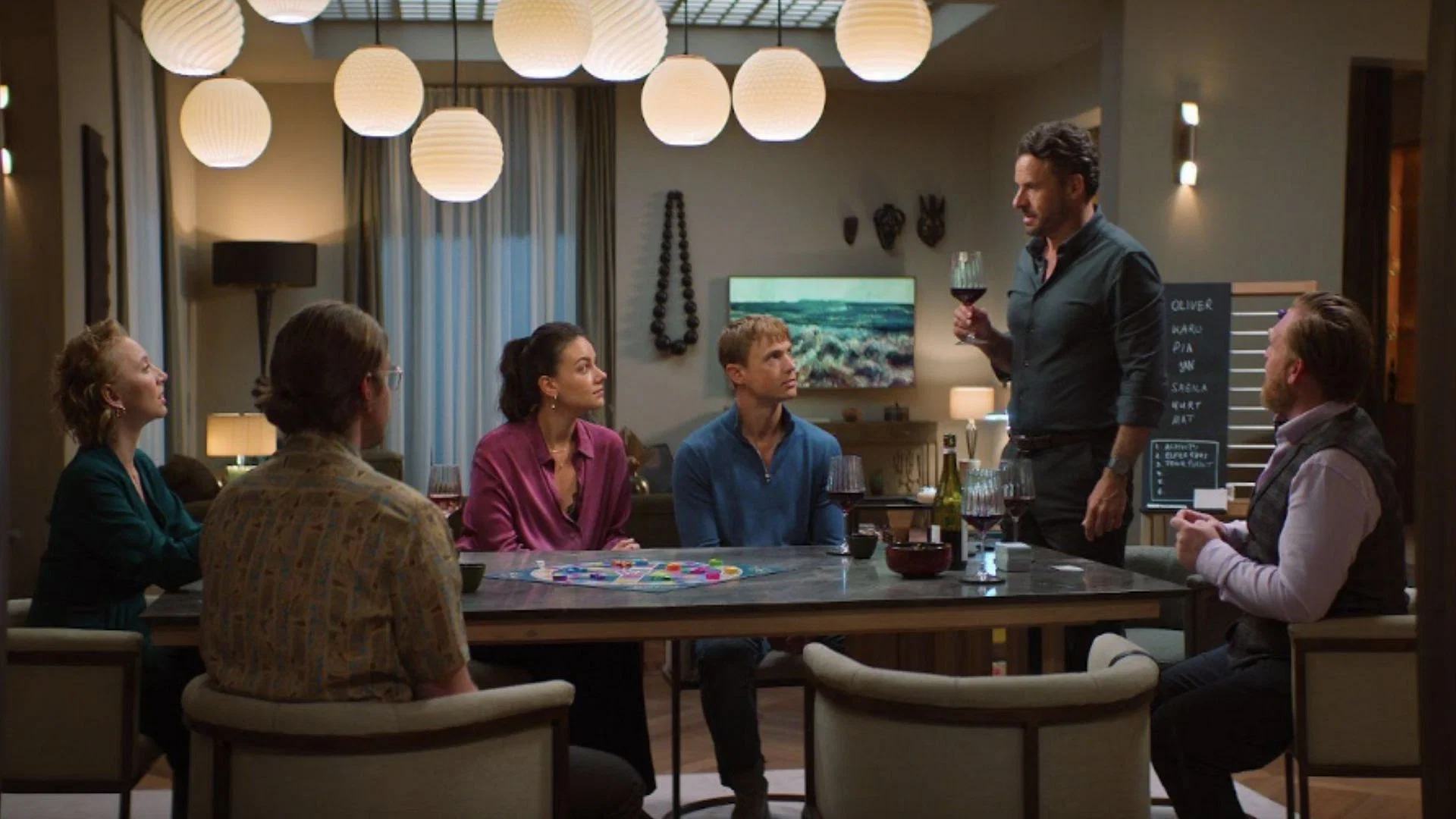Jan and Pia seem like the perfect couple when they first meet. He owns a friendly local bike shop, and she’s a talented photographer with a playful spirit. After their dogs strike up a chance park meeting, the two fall for each other quickly. But when Pia invites Jan to join her normal monthly game night with friends, tensions suddenly flare.
This gathering doesn’t feature the relaxed fun Jan expected. Pia’s friends act cool and judgmental toward the outsiders in their elite social circle. Jan feels self-conscious about his lack of wealth and education compared to their luxury homes and high-paying jobs. To make matters worse, Pia’s charming ex, Matthias, shows up unannounced, still carrying a torch and ready to stir up trouble between the new lovers.
As the games and drinks flow, hidden relationship issues and personality flaws emerge. Matthias competes aggressively with Jan for Pia’s affection. A dissatisfied couple among the friends snipes at each other constantly. Yet through it all, Jan and Pia’s bond provides an anchor of care and understanding. If they can make it through this rocky night, their fresh romance may have a bright future despite challenges from the outside.
Blame the Game uses this entertaining premise of an “unusual game night” to explore deeper themes around social dynamics, class differences, loyalty, facades, and what really makes relationships work. Though the characters feel painfully real at times, humor and heart keep the movie entertaining and insightful for any viewers who’ve experienced awkward social tests when falling for someone.
An Unlikely Pairing
New lovers Jan and Pia seem like a nice match. He owns a friendly local bike shop, while she’s a photography whiz with a playful spirit. The two meet in the park one day thanks to their dogs, and it’s puppy love at first sight. They spent their early days wrapped up in each other, enjoying the natural high of new romance.
However, the blissful bubble must eventually pop. Pia decides it’s time to introduce Jan to her tight-knit circle of friends. They’ve been having their monthly game nights for years, and she wants Jan to join in on the fun. But this gathering is very different from Jan’s usual scene.
Pia’s pals are an ambitious bunch. Successful careers and expensive homes separate them from Jan’s more laid-back lifestyle. It’s immediately clear that Jan feels like an outsider in this fancy world. Things get worse when Pia’s ex, the charming dentist Matthias, crashes the party unexpectedly. He takes an instant dislike to the interloper in January.
As the games and drinks flow, tensions climb higher. Matthias delights in showing off and putting Jan on the spot. Jan tries to fit in yet continuously feels judged by these new acquaintances. A dissatisfied couple among the crew also injects squabbles into the mix.
When naked ping pong turns the battle between Jan and Matthias physical, lines are truly crossed. No one steps in to cool things down, either. By this point, all the underlying social dynamics are boiling over thanks to this “unlikely pairing” of very different personalities. It seems Pia and Jan’s new love may not survive the disruptive forces of this fateful night.
Finding the Odd One Out
Our leads Jan and Pia have quite the endearing romance blooming at the start. It’s easy to see why they fall for each other—they share a playful spirit and comfort in each other’s company. But when Jan accompanies Pia to her regular game night, he gets thrust into a very different world.
Pia’s exclusive circle lives lavishly in Berlin’s high-end Grunewald neighborhood. Jan sticks out like a sore thumb in this affluent bunch. Most work high-powered jobs and look down on Jan’s more humble lifestyle running a bike shop. They make snotty remarks about his background and education.
It doesn’t help that Pia’s charming ex, Matthias, crashes the party. He takes an instant dislike for Jan and strives to rekindle things with Pia all night. Matthias clearly feels entitled and superior to Jan, flaunting his wealth, knowledge, and physique at every turn. The constant jibes eat away at Jan’s confidence in himself and the relationship.
Each friend has their own quirks that add tension. Businesswoman Karo seems stressed about balancing her career and family. Her husband, Oliver, faces accusations of laziness. Lesbian Sheila remains bitter after a breakup. Rich party boy Kurt creates drama without filters. Underneath the allure of success, it’s clear that troubles brew beneath the surface in all their lives too.
Throughout the uncomfortable evening, Jan finds little support. Even Pia doesn’t seem to fully comprehend his feelings of inadequacy in this social circle so different from his own. The growing unease, judgement, and meddling of Matthias leaves Jan an anxious outsider grasping for acceptance. As things escalate out of hand, it cements Jan as the odd one out in this exclusive world of Pia’s privileged pals.
Beneath the Surface
This film subtly explores several deeper themes. Class plays a role in how Jan is treated once she joins this affluent friend circle. With his more modest background running a bike shop, some just can’t seem to look past it. The constant reminders of what he “lacks” in their eyes clearly chip away at Jan’s confidence.
Not helping is the introduction of Pia’s ex, Matthias. His history with Pia and clear intentions of rekindling something bring into question where her loyalties truly lie. As the night spirals, the trust between the new couple faces a serious test.
Yet underneath the luxury surroundings, it seems this group has issues of their own. Through escalating antics and revelations over games, we learn marriages may be crumbling while past heartbreaks clearly haven’t healed. Their perfection seems more like a like a facade than a reality.
All the while, Jan finds himself thrust into increasingly absurd scenarios. But it’s through this “comedy of errors” approach that the film peels back layers. The deeper dynamics and uncomfortable truths get harder to ignore as the lines between fiction and reality blur. Sometimes it takes the bizarre events of one bizarre night to shine a light on the less flattering aspects we all keep buried. By the film’s end, through laughter or not, these characters gain more clarity than they perhaps planned for.
In the end, class means little in the face of the inner struggles we all face. And perhaps the greatest joke is that quest for perfection, which tries to define human experiences into neat little boxes when messy humanity lies just underneath.
Keeping it Light
This film falls squarely in the category of light situational comedy. It embraces familiar tropes and exaggerated scenarios we’ve seen numerous times before. Yet it manages to bring something unique to its characters and focus on relationships over plot twists.
Many of the comedic elements will feel instantly recognizable. From awkward introductions to mishaps spiraling things further out of control, it checks the boxes of the “game night gone wrong” premise. Some write it off as too predictable. But the directors seem less intent on redefining conventions as using them to simply provide laughs. When the rich friend orders expensive sushi just to one-up the new guy, we groan, but also grin, knowing what’s coming.
Underneath the surface hijinks, it explores deeper territory around trust, loyalty, and our constant quest for validation. We’ve seen elements in other films like Game Night, yet the focus stays squarely on the characters rather than big action set pieces. Their humanity shines through, even amidst drunken foibles at the local zoo.
The tone beautifully balances these worlds. Moments of drama feel earned instead of forced. We genuinely care about Jan and Pia’s future because of their sweet chemistry earlier. The script respects the audience’s intelligence too, never lingering too long on superficial conflict at the expense of meaningful resolution.
All told, it is a breezy and entertaining watch that leaves us both amused and thoughtful. Sometimes the simplest intentions, when executed with heart, are enough. This film is a joy precisely because it doesn’t take itself too seriously yet provides respite from a complex world. Maybe that’s why these characters’ struggles feel universal enough to leave an impact long after the final credits roll.
Keeping the Fun Flowing
This film had all the right pieces—a fun premise, solid performances, and clear character development—to be an outright comedy hit. But some questionable choices caused the fun factor to wax and wane.
The opening act really hooked you with Jan and Pia’s charming meet-cute. Their chemistry lit up the screen and left you eager to see where things led. But then the focus shifted almost entirely to her insufferable friends. Now, depicting tension and obstacles for our leads is important. But we spent so much time with these profoundly unlikable people that it actively slowed the pace.
You found yourself thinking, “Ugh, not these jerks again,” whenever they reappeared. It became a chore to sit through their endless petty jabs and one-upmanship. We got the point early: they’re elitist and judgmental. Drawing it out so much risked killing the comedic momentum the film had built.
The premise also hinted at a richer exploration of games as a reflection of social dynamics. But it settled on using them as mostly superficial devices to embarrass Jan or fuel conflict. Seeing the characters’ true colors emerge through clever game scenarios could have been revelatory.
All that said, the central performances and character arcs still shone through. Jan and Pia’s acting sold their chemistry completely. And Janina Uhse, in particular, imbued Pia with warmth and complexity that kept her quite sympathetic. Beyond the surface, you get a real sense of their struggles and growth.
Ultimately, this film landed in an enjoyable, thoughtful place by the end. It had meaning to convey about relationships, ego, and finding belonging. So despite some flaws that pulled it short of greatness, it still succeeded as a fun night’s watch. With just a tweak here and there to streamline the focus, it could have been remembered as so much more.
Games People Play
Blame the Game uses its game-night setting to reveal some broader truths about its characters and their dynamics. Does it offer anything wholly original? Not quite. But as a breezy comedy exploring modern relationships, it delivers some laughs and insights along the way.
The premise gives the film license to excavate what’s beneath the surface of Pia’s friend group. Through competitive games and escalating tensions, their issues and egos inevitably shine through. Jan finds himself navigating these treacherous waters, trying to win over his girlfriend amidst all the chaos. Dennis Mojen and Janina Uhse shine in their roles as the young couple caught in the middle of it all, riding out an uncomfortable evening together with charm.
Many of the tropes feel familiar—the stuffy rich friends, the antagonistic ex looking to reclaim his turf. But director Marco Petry stages them entertainably enough without overstaying their welcome. Some of the games grow a bit dull, but that’s par for the course for anything promising wild escapades that never fully materialize.
For fans of light German comedy or romantic features using games as a plot device, Blame the Game proves an entertaining way to while away an evening. Its charismatic leads and fish-out-of-water story keep things engaging enough to hit the streaming play button. While it may not revolutionize the genre, its approach remains enjoyable for anyone seeking an undemanding watch with a few laughs along the way. In the end, that’s sufficient for this type of film to consider its mission accomplished.
The Review
Blame the Game
In summary, Blame the Game provides a few chuckles as it uses a game-night setting to explore relationship dynamics but doesn't fully capitalize on its premise or break new narrative ground. Nevertheless, Janina Uhse and Dennis Mojen's likable performances help carry the straightforward comedy through its predictable yet entertaining fish-out-of-water plot.
PROS
- Likable leads Janina Uhse and Dennis Mojen, who elevate the material.
- Entertaining fish-out-of-water premise that leads to some comical moments
- Offers social commentary on class differences and relationship dynamics.
CONS
- Predictable and fails to fully capitalize on its game-night concept
- The supporting characters of rich friends are one-dimensional and irritating.
- The plot is neither particularly original nor memorable.


















































